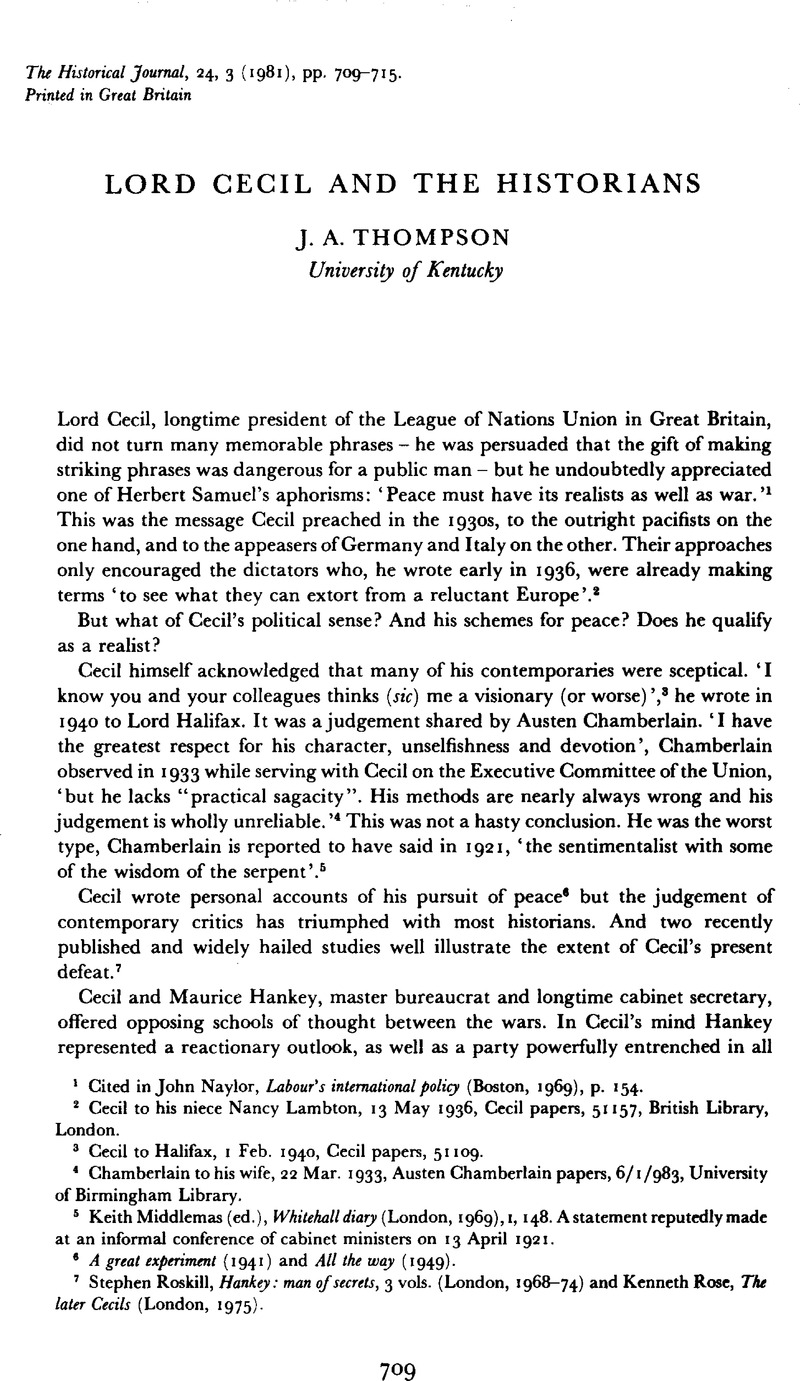No CrossRef data available.
Published online by Cambridge University Press: 11 February 2009

1 Cited in John, Naylor, Labour's international policy (Boston, 1969), p. 154.Google Scholar
2 Cecil to his niece Nancy Lambton, 13 May 1936, Cecil papers, 51157, British Library, London.
3 Cecil to Halifax, 1 Feb. 1940, Cecil papers, 51109.
4 Chamberlain to his wife, 22 Mar. 1933, Austen Chamberlain papers, 6/1/983, University of Birmingham Library.
5 Keith, Middlemas (ed.), Whitehall diary (London, 1969), 1, 148. A statement reputedly made at an informal conference of cabinet ministers on 13 April 1921.Google Scholar
6 A great experiment (1941) and All the way (1949).
7 Stephen, Roskill, Hankey: man of secrets, 3 vols. (London, 1968–1974)Google Scholar and Kenneth, Rose, The later Cecils (London, 1975).Google Scholar
8 Cecil outlined the two philosophies in a letter to Herbert Asquith and sent a copy to Gilbert Murray, 3 Mar. 1922, Gilbert Murray papers, Bodleian Library, Oxford. See also Murray, , The League of Nations movement: some recollections of the early days (London, 1955).Google Scholar For the correspondence see Hankey to Cecil, 4 Aug. 1925 and reply by letter of 18 Aug. 1925, Cecil papers. Roskill refers to their exchange of Oct.-Nov. 1933 in Hankey: man of secrets, III, 88.
In the 1920s Union speakers and editors emphasized the pacific functions - investigation, arbitration, conciliation - of the League but in the 1930s ‘sanctions’, ‘material coercion’ and ‘enforcement of the law’ became code phrases. For a discussion of this change in emphasis see Thompson, J. A., ‘Lord Cecil and the pacifists in the League of Nations Union’, Historical Journal, xx, 4 (1977), 949–59.CrossRefGoogle Scholar
9 Stephen Roskill, Hankey: man of secrets, III, 88.
10 Stephen Roskill, III, 170. See the index in this volume for other references to Cecil.
11 Mr. Kenneth Rose has very kindly granted me permission to reproduce this passage from The later Cecils, pp. 168–9.
12 Cecil to Philip Baker, 27 June 1936, Cecil papers, 51108.
13 Address of 12 Oct. 1937 delivered at Caxton Hall, Westminster and reproduced in the Nov. 1937 issue of Headway, the LNU journal.
14 This theme is developed in a letter to Philip Baker, 4 May 1935, Cecil papers, 51108. Cecil was irritated by ‘ The Times and Co.’ who took private assurances of various Germans at their face value and ignored the actual policy Germany pursued.
15 Murray to Cecil on Manchuria, 4 Jan. 1933, Gilbert Murray papers.
16 Question of 27 Feb. 1932. Cited in Christopher, Thorne, The limits of foreign policy: the west, the League and the far eastern crisis of 1931–1933 (London, 1972), p. 409.Google Scholar
17 Stephen Roskill, iii, 35–6.
18 Churchill to Cecil, 9 Apr. 1936, Cecil papers, 51073.
19 Outlined in a memo dated 28 Oct. 1937 and sent to Cecil by A. R. Richards, Cecil papers. See also Eugen, Spier, Focus (London, 1965), for a history of Focus, the group created to supply Churchill a platform in the country for his campaign.Google Scholar
20 For example, General Spears, Harold Nicholson and Violet Bonham Carter.
21 See Eugen Spier, Focus, p. 141, and ‘ Memo for Sir Norman Angell on Plan for New Union Magazine’, dated 3 June 1938, Cecil papers, 51140. The venture was not a financial success and the Union reclaimed control in June, 1939. See minutes of the Executive Committee of the League of Nations Union, June 1939, Book 17, p. 330, London School of Economics.
22 Minutes of the Executive Committee, 23 June 1939, Book 16, p. 482. The office itself was not significant, for the Union had many vice-presidents, but Churchill accepted when some vice-presidents were regretting their association, and he took office without qualifications.
23 Cecil to Lord Stamford, 18 Mar. 1938, Cecil papers, 51139.
24 See, for example, Churchill to Cecil, 26 Nov. 1936 and letter from latter to Churchill, 1 Dec. 1936, Cecil papers, 51073.
25 Cecil to Lord Salisbury, 8 May 1941, Cecil papers, 51086. Cecil added that no one at the LNU had objected.
26 House of Lords Debates, March 2, 1937, 5's, civ, 419 and 421.
27 Minute Book of the General Council of the League of Nations Union, iii, 232–8, London School of Economics.
28 Cecil's first recorded interview with the Russian ambassador is 5 Feb. 1934. Cecil wrote a summary of their conversation in a memo of the same date, Cecil papers, 51101.
29 Cecil to Murray, 17 Nov. 1936, Cecil papers, 51132.
30 Observation made in a review of Hankey: man of secrets, vol. iii, appearing in The Observer, 26 May 1974.
31 The comparison of H. A. L. Fisher. See Viscountess Cecil to Murray, 22 Oct. 1938, Gilbert Murray papers.
32 See the General Council Resolutions of 16 Dec. 1936 appearing in The League of Nations Union year book, 1938 and a memo on ‘British Armaments’ composed by Cecil on 22 Mar. 1937, Cecil papers, 51157.
33 Lytton to Miss K. D. Courtney, 30 Dec. 1936. Copy in Cecil papers, 51139.
34 Northedge, F. S., The troubled giant (London, 1966), p. 408.Google Scholar
35 Murray to Cecil, 19 Jan. 1938, Cecil papers, 51133.
36 See minutes of the Executive Committee, Nov. 3 and 10 1938, Book 17, pages 30, 37–9, 41 and 43.